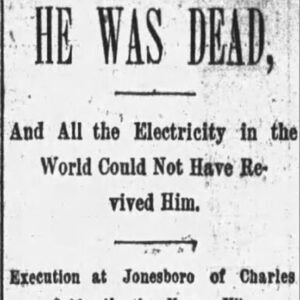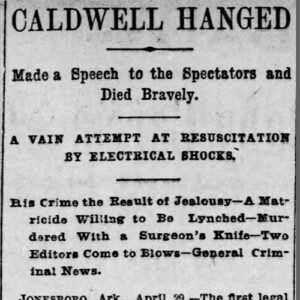calsfoundation@cals.org
Charles Caldwell (Execution of)
Charles Caldwell was an African American man hanged at Jonesboro (Craighead County) on April 29, 1893, in the first legal public execution in Craighead County. His corpse was afterward used in a bizarre experiment with electric batteries.
Charles Caldwell and Tab Freeman, whom he would later be charged with murdering, both lived at Big Bay, a sawmill station for the Kansas City and Memphis Railroad about ten miles east of Jonesboro, now the community of Bay (Craighead County). Freeman lived with a woman of whom Caldwell was also enamored, leading to bad blood between the two—Freeman at one point tried to kill Caldwell with an axe.
The two men were part of a group playing cards at the woman’s house on February 19, 1893, when they got into an argument over “some trivial matter,” and Caldwell grabbed a nearby shotgun and fired, “the entire load taking effect in Freeman’s body.” Freeman died soon afterward, and Caldwell was arrested.
Caldwell was tried in March 1893 and convicted of first-degree murder, though he claimed self-defense. His lawyers requested a new trial, which the judge denied, sentencing Caldwell to hang on April 29, 1893. A newspaper noted that the judge, “in pronouncing the fatal sentence, was more nervous than was the burly African in receiving it,” adding that while Arkansas law would let no more than twenty-five people attend the execution, “but were it allowable several hundred seats within the fatal inclosure [sic] could now be sold for almost any price that might be asked.”
An appeal to the Arkansas Supreme Court failed, and Governor William Meade Fishback declined to commute Caldwell’s death sentence. The condemned man embraced religion as he awaited his execution.
A crowd began gathering in Jonesboro on the morning of April 29, 1893. Caldwell was taken from his cell at 1:45 p.m. and mounted a thirty-foot scaffold “above the immense throng,” where he gave a short speech, saying it “was the last time he would look upon the faces of his friends in this world, but that he hoped he would meet them all in heaven.”
The preachers who accompanied him sang, “Death Cannot Make My Soul Afraid,” in which “Caldwell joined with a firm voice.” A black cap was lowered over his head at 2:04 p.m., and a minute later “the trap door slipped from under the condemned man and he went down to his death with a heavy thud. Death was seemingly quick, only a slight tremor being noticed about three minutes after the drop fell.” He was declared dead nineteen minutes later.
A Missouri newspaper reported that “a half dozen physicians were present, and as soon as the body was cut down they applied electric batteries with the hope of restoring the negro to life, but to no avail.” The Arkansas Gazette concluded that “all the electric batteries of the earth could not bring him back.”
Caldwell’s was the first legal public execution conducted in Craighead County, though four men had been lynched there on March 12, 1881.
For additional information:
“Caldwell Hanged.” St. Louis [Missouri] Post-Dispatch, April 30, 1893, p. 6.
“Charles Caldwell to Hang.” St. Louis Post-Dispatch, March 12, 1893, p. 8.
“Claims Self Defense.” Southern Standard, February 24, 1893, p. 4.
“Down To His Death.” Memphis [Tennessee] Commercial, April 30, 1893, p. 1.
“He Was Dead.” Arkansas Gazette, April 30, 1893, p. 1.
“Telegraphic Briefs.” Arkansas Gazette, February 22, 1893, p. 6.
“Through the Exchange.” Arkansas Gazette, February 24, 1893, p. 4.
“Through the Exchange.” Arkansas Gazette, March 28, 1893, p. 4.
Mark K. Christ
Central Arkansas Library System
 Law
Law Post-Reconstruction through the Gilded Age, 1875 through 1900
Post-Reconstruction through the Gilded Age, 1875 through 1900 Charles Caldwell Execution Story
Charles Caldwell Execution Story  Charles Caldwell Execution Story
Charles Caldwell Execution Story 




Comments
No comments on this entry yet.